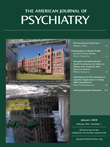Depression and Executive Dysfunction in Old Age
To The Editor: In the August 2007 issue of the Journal , Xingjia Cui, M.D., M.P.H., et al. reported on the prospective relation between depression and the decline of executive function in elderly patients (1) . They found that depression predicted a decline of executive functioning as measured with the Trails B and D Trails. Executive dysfunction, on the other hand, did not predict subsequent depression in 709 persons age 65 years and older. The authors concluded that depression can be a harbinger of subsequent cognitive impairment.
In contradiction to their introduction, the reciprocal relation between depression and executive dysfunction has been examined earlier (2 , 3 ). In the Leiden 85-Plus Study, we found that depressive symptoms at baseline were not related to an accelerated decline in various cognitive domains, including attention and processing speed. In contrast, impairment of attention and memory at baseline predicted an increase of depressive symptoms during follow-up. We concluded that cognitive impairment in old age precedes the onset of depressive symptoms and not the other way round. These findings were in line with another study examining the reciprocal relation between depression and cognitive impairment in old age, which concluded that depressive symptoms are an early manifestation rather than a predictor of cognitive impairment (3) .
What explains the remarkable difference between these conclusions and the conclusion of Dr. Cui et al.? It is well known that depression in old age may be a concomitant phenomenon of cognitive decline. Therefore, depressed subjects who already show cognitive decline at baseline should be excluded when examining the relation between depression and executive dysfunction. Although Dr. Cui et al. excluded 31 subjects suffering from dementia, subjects with executive dysfunction were included in their analyses. The finding that the relation between depression and executive dysfunction is stronger cross-sectionally than longitudinally (Table 3, beta=18.10 vs. beta=13.39) indeed suggests that depression is a concomitant phenomenon of executive dysfunction rather than an independent risk factor.
1. Cui X, Lyness JM, Tu M, King DA, Caine ED: Does depression precede or follow executive dysfunction? outcomes in older primary care patients. Am J Psychiatry 2007; 164:1221–1228Google Scholar
2. Vinkers DJ, Gussekloo J, Stek ML, Westendorp RGJ, van der Mast RC: Temporal relation between depression and cognitive impairment in old age: prospective population based study. BMJ 2004; 329:881Google Scholar
3. Chen P, Ganguli M, Mulsant BH, DeKosky ST: The temporal relationship between depressive symptoms and dementia: a community-based prospective study. Arch Gen Psychiatry 1999; 56:261–266Google Scholar



